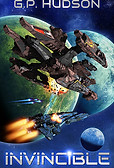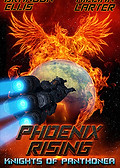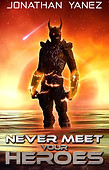Underrated Classics: Babylon 5
- Chris Fox
- Jul 27, 2018
- 6 min read
This week kicks off my brand new column: Underrated Classics. My fellow authors and I will be reviewing gems that you might not have heard of, but that might still be binge worthy fun for the modern science fiction geek.

In the dim recesses of the ancient past, before streaming, before TiVos, television was a completely different animal.
Conventional Hollywood wisdom said your show needed to be accessible to viewers who stumbled into the middle of a season, so season long arcs simply didn’t exist.
Character growth was rare, and most shows worked hard to restore things to their equilibrium by the end of every episode. It meant you could miss half a season, but still be reasonably up to speed with what was going on in your favorite show.
All that started to change in 1987 when Star Trek the Next Generation aired. At first it was also an episode of the week show, but by 1990 STNG boldly went where no other show had dared. At the end of season 3 the summer finale shocked the world. Our beloved Captain Picard was was assimilated, and reborn as Locutus of Borg.

Instead of resolving that by the end of the episode, they gave us a gigantic cliffhanger. We were going to have to wait 3 months to find out what happened.
That entire summer SF geeks couldn’t shut up. BBSs (bulletin board systems, the precursor to the modern web) were blowing up with theories. We badly wanted to know what happened, and TV execs of the day paid attention. They saw how engaged we were, and how we tuned in to the season 4 premier in record numbers.
As a result massive cliffhangers are now par for the course, but back then it simply wasn’t done. This was four years before X-Files, and nearly fifteen years before Lost.
Yet despite breaking some ground, Star Trek didn’t push the envelope much further. Within a couple episodes the whole Borg incident was dealt with and we were right back to an episode of the week format. STNG had mini-arcs through later seasons, but nothing like the continuous stories we’re familiar with today.
If you ask many science fiction fans what show really introduced the continuous story format, they might say Farscape. They might say Battlestar Galactica. Some would say Star Trek: Deep Space Nine, and point specifically to the Dominion War. Only a few will give you what I think is the correct answer— Babylon 5.
From its very first episode creator J. Michael Straczynski designed B5 to be one continuous five season story. He was building to something right from moment one, something no other science fiction IP had attempted. So much so that he wrote 92 of the original 110 episodes.
Straczynski envisioned a galaxy spanning war waged by an ancient darkness, one that humanity and our neighbor races would all be swept up by. None of this was clear to the audience, at first. The first season of B5 is unremarkable, and if you watch it now the costuming and sets are terribly dated.
That’s part of the reason the show did so poorly. B5 was ambitious, but the technology and budget weren’t quite there. It lacked the resources of its closest colleague of the day, Star Trek Deep Space Nine.

But somewhere near the end of season one I started to fall in love with some of the characters. Londo and G’Kar in particular. They begin as the very worst of enemies. Londo represents the failing empire. G'Kar represents the enslaved race that finally threw off their shackles, and are ready to conquer their former masters.
By the end their relationship is all together different, and they are different characters. Londo's arc is one of the most tragic I have ever seen, while the irony of G'Kar's is masterfully written.
But the character who really stole the sole? Mousey, overweight Vir. He was large and timid and awkward, and at first seeing him onscreen made me uncomfortable.

By the end of the series Vir is my favorite character, and he has one of the finest arcs in all of science fiction. Not only does the actor change physically, but the character grows at the same time. We see him gain confidence, and learn to defy the empire he fears for no other reason than it is the right thing to do.
This show made us really care for both protagonists and villains in a way that only shows like Game of Thrones have managed to pull off since.
So if B5 is so amazing why do so few people remember it? Why is it not mentioned alongside other classics? Because it was ahead of its time. We consumed content differently in the 90s.
Back in 1994 if fans missed one, or worse several episodes, they were completely lost. There was no easy way to see the episodes you missed. There was no iTunes. No Hulu or Netflix. Not even TiVo. Fans needed to catch live airings, and poor B5 suffered from a terrible time slot.
B5 aired on Wednesday nights at 9pm. Not only was it a school night, but I also had Magic the Gathering tourneys, and so I ended up missing a bunch of episodes and by the time season 3 started to air I was completely lost and gave up on the show.

It wasn’t until 2002 when I bought B5 on DVD that I was able to binge watch the show the way it was intended. Much of the first season is cringe-worthy. The sets are dated, and some of the acting is mediocre. I kept watching.
By season 2 I was giving up sleep to binge episodes. All of a sudden it became clear that there was a dark force in the galaxy, and that dark force was manipulating everyone. Londo and his once proud empire are offered help against the enslaved colony that they had brutally mistreated and has now risen up to challenge them.
Now that empire had a chance to return to greatness, and all it will cost is the soul of their leader, and the future of the entire galaxy.
Earth’s political situation was in constant turmoil, and it mirrored the politics of the day. By season 3 the writing hit full stride, and the character development was unparalleled.
Over the next two seasons a masterpiece unfolded. The Shadow War slowly engulfed the galaxy, episode after episode. We saw beloved characters fall, something that is commonplace now but unheard of back then. Plots started in season 1 didn’t come to fruition until season 4. It was clear the entire show was one cohesive story, a story I desperately needed the ending to.

I shelled out nearly $100 a season for those DVDs, and I did it gladly. They’re still sitting on my shelf 15 years later, and I’ve dusted them off for multiple viewings.
If you view the series for the first time after reading this, then you’ll probably find it clunky. The pacing is awkward. You’ll note that some episodes don’t really tie into the seasonal arc. Some actors were replaced. Some dialogue was…less than perfect.
B5 suffered from a number of problems, some caused by real life issues. Michael O'Hare, the original station commander, ended up stepping down from the role due to mental health reasons. He was replaced by John Sheridan, played by Bruce Boxleitner. I have to be honest. I couldn’t stand his acting at first. By the end of the show, though, I had a lot of affection for Sheridan.
B5 may be flawed, but you’ll also find a strong core that classics like Farscape, BSG, and The Expanse are tapping in to today. You’ll see that an entire generation of science fiction uses the same themes. Without B5 none of these properties would exist, and for that reason alone I think it’s worth a look.
So how about you? Did you watch B5 while it was on the air, or discover it later? What did you love about it? Was your favorite episode or character? We’d love to know!
Chris Fox is the author of The Void Wraith Saga and the Magitech Chronicles, and lives near San Francisco with his wife. You can learn more about him, his fiction, and his YouTube channel at chrisfoxwrites.com


































Comments